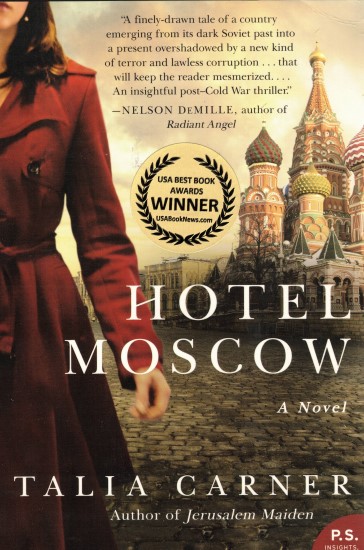Translated from Hebrew by Talia Carner (c)
(Note: This short story appeared in the “Railroad Stories” collection in which Tevye the dairyman keeps meeting the fictional author and recounts to him the various stories about his daughters. Those stories were theatrically adapted decades later into Fiddler on the Roof. The Man From Buenos Aires was Talia Carner’s inspiration to writing the novel, THE THIRD DAUGHTER.)
A train voyage is not necessarily as dispiriting as some might think, as long as you stumble upon good company. On occasions, you meet a merchant, a man with a good grasp of how things work, and then you’d have no idea where time had vanished. Other times you may occasion upon someone who isn’t a merchant but merely an experienced, bright, and polished man who knows the world intimately. Then, traveling in his company is as pleasurable as licking something delicious. And sometimes, God sends you just a lively, chattering passenger filled with joy, and he talks and talks; his mouth never shuts—and he blabbers only about himself.
With such a creature I had the chance of meeting and traveling a long way.
Our acquaintance started as most acquaintances on a railway train do, with some humdrum remark as: “Do you know the name of this station?” or “What time is it?” or, “Do you have a match?” Very soon, we became friends, as if we had known each other forever. At the first station where we stopped for a few minutes, he grabbed my arm and marched me to the bistro, and without asking me, ordered us two glasses of cognac. Then he winked and ordered something to eat, and as we sampled the herring and the kind of pickled hors-d’oeuvres found in any such eatery, he ordered us two steins of beer, picked out a cigar for himself and one for me—and thus our friendship was cemented.
“I want to tell you honestly, without flattery,” said my new comrade when we resumed our seats in the car, “that I like you, believe me or not, from the first moment I saw you. At first glance I said to myself, ‘There’s a man worth talking to.’ I hate, you hear, to sit in a train silently like a scarecrow. I like chatting with a live person. That’s why I purchased a third-class ticket, so I’d have company. Normally, I travel second-class. And do you think I can’t afford going first-class? I could if I wanted to. And don’t think that I’m just bragging. Here, look.”
With these words, my chap pulled a billfold from his hip pocket, stuffed with paper money, tapped on it as if it were a pillow, and tucked it away again.
“Not to worry. There’s more where that came from.”
I studied this remarkable creature and for the life of me couldn’t form an opinion as to his age. He might be forty, and then again somewhere in his twenties. His face was round and smooth-shaven, a bit tanned, with no sign of a beard or a mustache. He had little oily, laughing eyes, and all together was small, plump, energetic, vivacious—and faultlessly dressed in my taste: a snowy white shirt with gold studs, a new silk tie pierced with an elegant pin, a stylish blue suit of genuine English wool; a pair of luxurious, well-polished lacquered shoes. On his finger a heavy gold ring was set with a diamond that dazzled in the sunlight with a thousand sparkles. The ring alone must have cost no less than four or five hundred, or more.
To be well attired, in my opinion, is the most important for any man. I like to dress well and to see others do the same. I can tell by men’s get-up who is decent and who is not. There are those who’d say that this is no proof; that one may dress well yet commit whatever atrocity. But I ask you, and please answer only this: Why wouldn’t everyone dress well? I can bring you examples, but it’s not worth spending time on it. Better, let’s return to my new acquaintance and listen to the story he’s telling us.
“So my dear friend, you see that I can well afford to ride second-class. Do you think that I wish to scrimp? Money is garbage. But what? Believe me or not, I really enjoy third-class because I’m a man of simple tastes and I prefer ordinary people. I’m what you might call a democrat. I started out my career at the bottom. Like this.” My new acquaintance lowered his hand close to the floor to indicate how humble his beginning had been, “and I kept rising higher and higher.” He waved his hand toward the ceiling to indicate how high he’d grown. “Not at once. Don’t jump to conclusion. Slowly, slowly I plodded on, steadily. At first I was someone’s assistant. I say a assistant, but even until I got there a lot of water had flowed under the bridge. When I think back to my youth—believe me or not as you wish—the roots of my hair stands. I never allow my mind to dwell on it. I don’t want to remember. Perhaps you think it’s because I am ashamed of my origin? In fact, I tell everyone who I am. When asked where I came from, I’m not ashamed to say that I was born in Soschmaken. Do you know where is that Soschmaken? It’s a little town in Courland, not far from Mitau. It’s a town so little that I could have bought her today, all innards included. Maybe the place has changed and grown bigger, I wouldn’t know. But in my days there, believe me or not, Soschmaken couldn’t afford more than one orange that passed from hand to hand, from one homemaker to another to decorate her Shabbat table when set for guests.
“So I was raised in this Soschmaken on ear-ringing slaps, punches by iron fists, red flashes before my eyes, black-and-blue bruises on my body, and, on top of it, a hungry stomach. There’s nothing, but nothing I remember as vividly as I do the hunger. Hungry I was born into God’s world, and being hungry is my first memory—hunger, cramps and emptiness. Do you know what is sap? It oozes from the trunks of the pine trees, and violinists use it instead of rosin. I lived on it, believe me or not, for a whole summer. That was the summer my stepfather, a pug-nosed tailor, wrenched my arm out of its socket and threw me out of my mother’s house. I ran away from Soschmaken to Mitau. Look at my arm, here. It should show marks.”
At that, my chap pulls up his sleeve and exhibits what appears to be a soft, perfectly healthy arm, and continues, “I wandered around Mitau starved, naked and barefoot. I slunk about in stinking alleys until, thank God, I got my first job. I guided around an old Jewish hazzan. He had once been a famous cantor somewhere, but in his old age lost his eyesight, became a beggar, and needed to have someone lead him. The job wasn’t a bad one, but one had to have nerves of steel to tolerate the old man’s capriciousness. He was never satisfied, you hear, not for a single moment. He grumbled, nagged and pinched me, tearing off pieces of my flesh. He insisted that I wasn’t taking him to where he should be going. Where did he need to go? To this day I have no idea. Such a crazy hazzan! On top of it all, he made up all sorts of fairy tales about me. He boasted that my parents had converted to Christianity and wanted to baptize me too, but he—at great difficulties, troubles and suffering—had saved me from the goyim. I had to listen to all these lies and not burst out laughing. On the contrary, he also insisted that I make a solemn face while he wove up his stories.
“In short, I soon figured that I wouldn’t grow old guiding my cantor, so I jumped this job and skipped out to Libau. After wandering around starving there for a time, I joined a group of indigent emigrants. They planned to embark a boat going very far, all the way to Buenos Aires. I begged them to take me with them. Who? What? They told me it was impossible; it wasn’t up to them but to a committee. The committee determined who would go. So I rushed over to the committee, cried, fell to the floor and implored to be sent to Buenos Aires.
“If you struck me dead for it, I couldn’t have told you what was Buenos Aires. Who was Buenos Aires? The others were going there, so I was going too. It wasn’t until we reached Buenos Aires that I learned we were really headed to a much farther place; Buenos Aires was merely a point from which we were sent to different destinations. As soon as we landed, they took down our names and shipped us off to a place even Adam himself had never seen in his dreams, and put us to work. If you want to know what kind of work, better don’t ask. Our ancestors in Egypt surely never had to labor as hard. And all their sufferings as told in the Haggadah weren’t even a tenth of what we endured. Tradition has it that our forefathers kneaded clay and made bricks and built Pithom and Ramses. Big deal! Let’s see them try with bare hands to cultivate the vast, arid prairies covered with thorn thickets; to control huge savage oxen that could kill a man with a toss of the head; to handle wild horses which you had first to chase a hundred miles with a lasso before you caught them; to taste at least once the attack of mosquitoes that ate your flesh every night; to chew on sugar cane that tasted like stone; to avoid worms writhing in the fetid water. Once, believe me or not, I saw my face reflected in a river and I scared myself. The skin peeled off, eyes inflamed, hands swollen like pastries, feet bleeding—and overgrown hair from top to bottom.
“’Is that’s you, Motek of Soschmaken?’ I asked myself, and started laughing. On that same day I spat on the huge oxen, the wild horses, the barren prairies and slimy water, and Motek started off on foot for Buenos Aires.
“There must be a fine bistro in this station where we’ve just stopped. Check the timetable. Don’t you think it’s time to put something in our mouths? It will strengthen us to continue telling the story.”
We dine extravagantly, wash down with beer, and again smoke a cigar each— superb, fragrant, genuine Havanas straight from Buenos Aires—and after we retake our seats in the train, my new acquaintance continues his life story.
“Buenos Aires, let me tell you, is the finest place built since God had created the universe. Have you ever been to America? To New York? Never? London? No? What about Madrid? Constantinople? Paris? There neither? Nu, then there’s no way of describing to you what Buenos Aires is like. I can only say that it’s a great abyss. Hell. A hell and a paradise. That is, for one person it’s hell, and for another the Garden of Eden. One must be alert and catch the right moment, and then he can make a fortune. Believe me, gold is rolling in the streets. You walk around and literally step on gold. You bend over, put out your hand, and just stoop up as much as you want. Just make sure that no one runs you over while you do it. The principle is never to stop, not to get lost in thoughts. Not to ponder what’s becoming for me and what’s not. Everything should be becoming for you. Take a job as a waiter in a restaurant—that’s fine; a shop clerk—fine too; wash bottles in a tavern—fine; be a peddler—fine; run in the streets and shout out the news in the papers—that’s fine; to wash dogs—fine; feed cats—fine; catch mice and skin them for their tiny furs—fine. In a word, anything is appropriate, and I’ve experienced them all. But hear this one thing that I learned: To work for others stinks; it guarantees that you’ll remain poor to the end of your days. A thousand times better is make others work for you. What are we to do if God made the world so that the one fellow must sweat to brew beer while another drinks it? Or one fellow must roll cigars while another smokes them? The locomotive driver runs the engine, the engine stoker shovels coal, the yardman greases the wheels, and you and I sit here in the car and tell stories. If they don’t like it, all they got to do is to create the world over again.”
I observe my chap. Who is he really? A rich upstart? Some former sweatshop tailor in America who now owns a clothing store? Possibly a manufacturer, or a tenement landlord. Even perhaps a capitalist living on his interest? But I let him prattle on. He’ll explain it better if not interrupted.
“It’s a smart world, you hear, a sweet and generous world. To live in this world lifts the soul. One just must watch that no one spits into your porridge. I wriggled, threw myself from side to side, worked, as they say, in every stinking job. No job was too much for me, no gainful employment too ugly. If you want to know, there’s no ugly employment. All are pretty, as long as one is honest, and your word is a word. I know it from myself. I won’t brag to you that I’m the Lamberg rabbi, but believe me that I am no thief, and certainly not a robber. Nor am I a swindler. I should have as good many years as I am an honest merchant. I deal square, and I trick no one. You will find no hidden cat in the sac with me. In short, do you want to know what I am? I am simply a procurer, what you’d call a purveyor. I provide the public with merchandise, merchandise that everyone knows, yet no one speaks of. Why? Because the public is too clever, and people are begrudging. They hate to be told that black is black and white is white. Instead, they prefer to say that black is called white and white is called black. Oh, well. What is one to do about them?”
I observe my chum from Buenos Aires and think, “God in Heaven! Who is this creature? What is the merchandize he procures, this purveyor? Why does he babble weirdly, black—white, white—black?” But I restrain my impulse to interrupt him to ask, “Uncle, what are your goods anyway?” Instead, let him prater on.
“In short, where were we? Oh, my current business in Buenos Aires. But my business isn’t in Buenos Aires. If you wish to know, my business all over the world: In Paris, London, Budapest, Boston. My headquarters, though, is in Buenos Aires. Too bad that we aren’t there now. I would have taken you to my office and shown you my “fellows.” All my fellows live well, like the Rothschilds. They work no more than eight-hour a day. In my employ, a fellow is regarded as a human being. Do you know why? Because I myself used to be a fellow for those who are now my partners. We are three owners. Formerly there were only two, and I was their right hand. I can say that I carried the entire business on my shoulders: purchasing, sales, appraisal of merchandize, sorting merchandize—it was all me. I have the eye for it. Believe me or not, one glance and I can tell what it’s worth and how far it should move. But having a keen eye is not enough in our business. You must have, you hear, also a sharp nose, an acute sense of smell. One must sniff from a mile what kind of a dog is buried there, to intuit where you can make a profitable trade and also where you might break your bones and sink in a swamp way over your head until you have stories to tell two generations hence. There are too many do-gooders in the world, too many eyes scrutinizing our business—enough to make us worry about the evil-eye. Ha-ha! One false step and ten rivers won’t wash the filth off of you. Some trifling blunder and you get the public screaming, chaos, stuff spread all over the newspapers. The papers need nothing much; for them it’s manna from heaven. They discover a minor sensation and they dish it out over seventy-seven plates. They blow air into the fire and make it dangerous. They wake up the police, although, I tell you in the highest confidence that the police all over the world, ha-ha, is in our back pocket. If I were to quote to you the yearly amount of money the police cost us you would be shocked. For us, though, giving is generous: ten thousand, fifteen thousand, or twenty thousand—poof!”
With these words, my chap gestures with his hand as if he is tossing about a few thousands. As he does so, the big diamond on his finger sparkles in the sun, and the man from Buenos Aires, who splashes in thousands, pauses and observes me to see whether his make-believe thousands have dazzled me. Then he goes on.
“And if one must pay more, do you suppose there’s a choice? In that respect, we have mutual trust. I mean, the three partners believe each other implicitly. We take each other’s word about how many thousands we promise the police. We pay each other’s expenses by word alone. No one would conceal a thing from his partner, you hear. And suppose you tried to do it, it would end badly for you. We know each other mighty well, we know the place where we hang out, and we know the whole world. Each of us has his own personal agents and his own spies. Did you suppose otherwise? In a business that is based on a code of conduct it can’t be done otherwise…. Don’t think it’s high time we hop off at this coming station and wet our throats again?”
With this, my chap grabs my hand and looks deeply into my eyes.
Of course, I have nothing against it, and at the stop we hop off to rinse our throats. One by one we empty bottles of lemonades, and my chum drink with enviable zest. But all this time my mind puzzles. What’s the nature of the merchandise of this man from Buenos Aires? How come he is flushed with money? And why should the police of the whole wide world be tucked in his pocket? Why should he need agents and spies? Is he a smuggler of faux diamonds? Of stolen goods? Or is he merely a crazy boaster, a loud big talker, one of those men under whose tongues everything multiplies both width-wise and length-wise? We traveling salesmen, have coined a name for such a guy when one happens to drop in our midst: “A wholesaler.” Meaning, someone who only talks of bulk quantities. Or, in simpler Yiddish: A liar who weaves stories of grandeur.
Yet soon, after we smoke fresh cigars, we resume our seats in the train, and the man from Buenos Aires rattles on:
“So where were we? Oh, my partners, I mean my present partners. Formerly they were my bosses and I was, as I just said, their fellow, their assistant. It wouldn’t slander them and say that they were bad bosses. How could they be bad toward me when I was as loyal as a dog? A centime of theirs was as much to me as a centime of my own. And I made enemies because of them, bitter enemies! At times they tried to poison me because of my loyalty to my bosses. Literally poison me. I can honestly boast to you that I served them most faithfully. True, I didn’t forget myself . A man should never forget himself. A man should always bear in mind that he is human—alive today, but what about tomorrow? Ha-ha! Working for someone else is never a good plan. What, don’t I have hands? Legs? Or tongue? Especially since I knew that they couldn’t get along without me for a single day. They couldn’t and I didn’t intend that they should. There are secrets in our business. Piles upon piles of them, as is the way of business. So one day I churned the matter in my head and went to my bosses and said, ‘Adieu, dear sirs.’ They stared at me. ‘What do you mean by Adieu?’ ‘Good-bye’, I say, ‘and be well.’ Then they say, ‘What’s the matter?’ and i say, ‘How long will it take?’ They glanced at each other and asked ‘How much money do you have?’ I answered, ‘Whatever the amount, it will suffice at first, and if not, then God is our Father and Buenos Aires is a big metropolitan.’ Naturally they got my drift. Why shouldn’t they? Their brains hadn’t shrunk. So from that day we became partners. Three partners, three bosses, all equal. None has more, the other less. Whatever God provides. Nor do we ever fight. Why should we since we’re doing well, and our business is flourishing? Our customer base is growing, and goods become more valuable. Each of us takes from the common capital what he needs for personal expenses. We are all big spenders. I alone, with no wife or children, believe it or not, spend three times as much as the average fellow with a wife and children. My yearly charity alone—anyone should wish that income for himself. There is nothing in the world that I don’t spend money on: synagogues, hospitals, emigrant charities, concerts. Buenos Aires—should the evil eye keep away—is some city. And what about other towns? The Holy Land even, believe me or not, costs me money. Recently I got a letter from a yeshiva in Jerusalem. A fine letterhead with the Star of David and ornate design, and signed by rabbis. It was addressed to me directly with this honorific address: ‘The distinguished, great gentleman, Reb Mordechai’. Aha!! I think to myself, if these fine gents addressed me so respectfully, I can’t be a pig and I should send them a few hundreds.
“These are only side donations. Now, what about my birth town, Soschmaken? Soschmaken gets from me every year, believe it or not, a hatful of money. Time and again I get a note from there. It’s really a problem. Wildly out of control. I’m not talking now about the aid for the holiday needs of the poor—every Passover, one hundred. This has become a law…. Now that I’m on my way to Soschmaken I already know that I’ll have to leave there a thousand. Did I say a thousand? I wish I could get away from them with two thousands, and if not, it will be three. That’s a small thing? I haven’t been home for so long—since childhood. Ha-ha! Soschmaken is still my home. I know beforehand that the whole town will jump from excitement. People will run to the street to see me, all ecstasy and joy as they will shout: ‘Motek has arrived! Our Motek from Buenos Aires!’ A celebration! Take if from me that they’re waiting for me as for the Messiah, these poor wretched people. From every stop along the way I let them know that I’m coming. I wire daily: ‘I am on my way—Motek.’ Believe me or not, I am anxious to get to Soschmaken fast. I just want to lay my eyes on Soschmaken, kiss the ground of Soschmaken, kiss its dust. To hell with Buenos Aires. To hell with New York. To hell with London. To hell with Paris. Ha-ha! Soschmaken is my home”.
With these words, the face of my little chap transforms. A new visage, as if his face has become younger and handsomer. The little oily eyes shine with a new fire, a glow of joy, pride, and love. A genuine love, unaffected. It’s a shame that I still don’t know what merchandise he hawks. But he leaves me no time to think as he rattles on.
“You are wondering why I am going to Soschmaken? Partly I miss the town, and partly to pray on the graves of my ancestors. In the cemetery I’ve got a father and mother and brothers and sisters. A whole family. And while there, I may take the opportunity to get married. How long can a man remain a bachelor? For a match I want someone from Soschmaken, from my own home town, my own class, my own kin. I’ve already written to friends, asking them to search for me a decent match. They’ve written back that I needn’t worry, that there are plenty of suitable girls. I am insane. In Buenos Aires I was offered the greatest beauties in the world. I could, you hear, do better than the Sultan of Turkey. But I told myself emphatically: ‘No, to get married I’m going to Soschmaken.’ I want a virtuous girl, a Jewish girl. She may be poor, that’s all the same to me. I’ll cover her with gold. I’ll shower gold on her parents. I’ll be a rich benefactor to the whole family. My bride, I’ll take to Buenos Aires and decorate for her a palace like for a princess. Under my care, not a speck of dust will fall on her. She’ll be happy, believe me or not, more than any woman in the world. She will need not bother with anything outside her household, her husband and her children. My boys will study: One will become a doctor, one an engineer, and another a lawyer. I’ll send my daughters to the most exclusive Jewish boarding school. Do you know where? To Frankfurt, where they’ll learn religion, but also languages and good manners.
Just then the conductor comes to check our tickets. He always blows in with the wind at the wrong moment. Instantly, a great commotion in the car. Mayhem. Everyone grabs his luggage, as I must do too. I must change cars to get on another line. The man from Buenos Aires helps me get my stuff together, while we continue to chat. Here is what he says, and I quote him word by word:
“Too bad that you’re not continuing. It will be awfully dull with no one to talk to.”
“What’s a man to do? I must make a living.”
“Quite true. Business first. I’ll take second-class. Thank God, I could afford first-class. When I travel, I—”
“My apology for interrupting, but we have only half a minute. I want to ask you something.”
“What?”
“I’d like to know—oh, the horn is whistling—what is your business? What’s your merchandise?”
“My merchandise? Ha-ha! Well, I’m not peddling Hanukkah candles.”
I am already on the platform with my belongings, and my man from Buenos Aires stands in the car’s vestibule, beaming with his smooth, self-satisfied countenance, a fragrant cigar between his teeth. As the train pulls away, my ears ring with his last words, “Ha-ha! Well, I’m not peddling Hanukkah candles.”
–Published 1909
(Translator’s note: What if, after being expelled from their home during a pogrom, Tevye’s family encounters this shady man from Buenos Aires? This the story of THE THIRD DAUGHTER, by Talia Carner.)
(c) Copyright note for this translation: The story is available to be posted as a whole on other websites but must contain the translator’s byline and this note as an integral part of the posted story: “The Israeli-born Talia Carner is the author of five novels in English, each covering a social issue. She lives in New York and Florida. www.TaliaCarner.com ”
# # #





